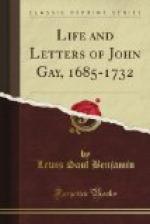The publication in book form of “Three Hours After Marriage” by Lintott, who paid L16 2s. 6d. for the copyright, a few days after the production, did nothing to arrest the torrent of abuse. “Gay’s play, among the rest, has cost much time and long suffering to stem a tide of malice and party, that certain authors have raised against it,” Pope wrote to Parnell. Amongst those foremost among the attackers was Addison, who perhaps had not forgotten or forgiven the parody of some of the lines in his play “Cato,” which was introduced by Gay in “The What D’ye Call It.” Gay, the most easy-going of men, was always stirred by criticism, and in this case he, with unusual energy, sat down to reply to his detractors. “Mr. Addison and his friends had exclaimed so much against Gay’s ’Three Hours After Marriage’ for obscenities, that it provoked him to write ’A Letter from a Lady in the City to a Lady in the Country’ on that subject,” so runs a passage in Spence’s Anecdotes of Pope. “In it he quoted the passages which had been most exclaimed against, and opposed other passages to them from Addison’s and Steele’s plays. These were aggravated in the same manner that they served his, and appeared worse. Had it been published it would have made Addison appear ridiculous, which he could bear as little as any man. I therefore prevailed upon Gay not to print it, and have the manuscript now by me."[11] In Spence’s Anecdotes there is another passage bearing on the same matter: “A fortnight before Addison’s death, [12] Lord Warwick [13] came to Gay and pressed him in a very particular manner ‘to go and see Mr. Addison,’ which he had not done for a great while. Gay went, and found Addison in a very weak way. He received him in the kindest manner and told him, ’that




